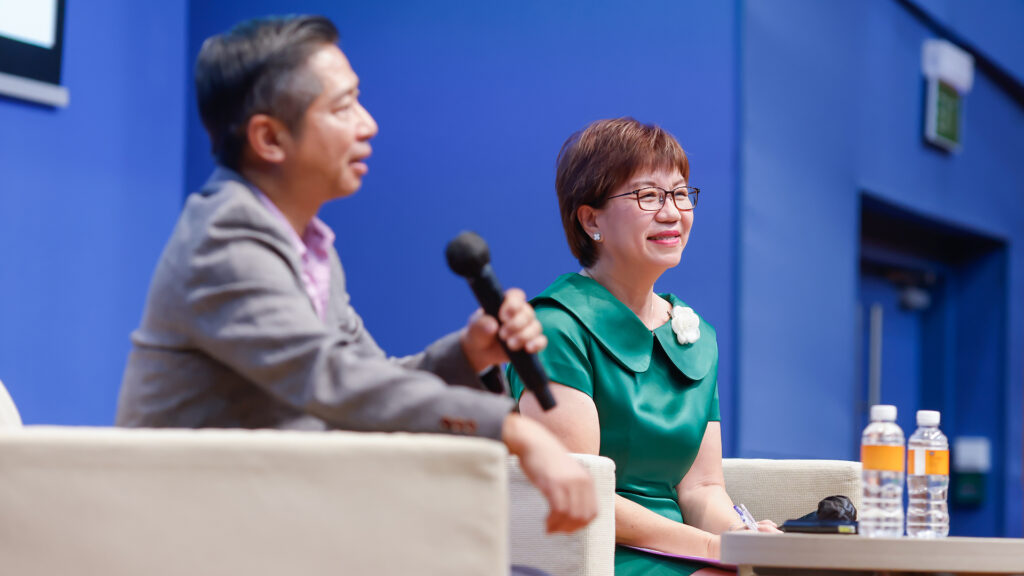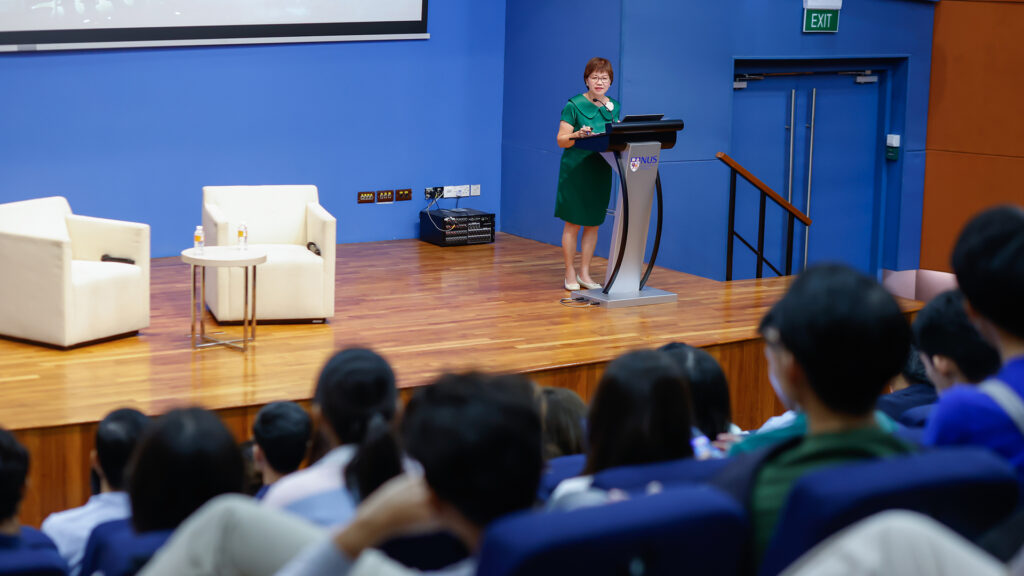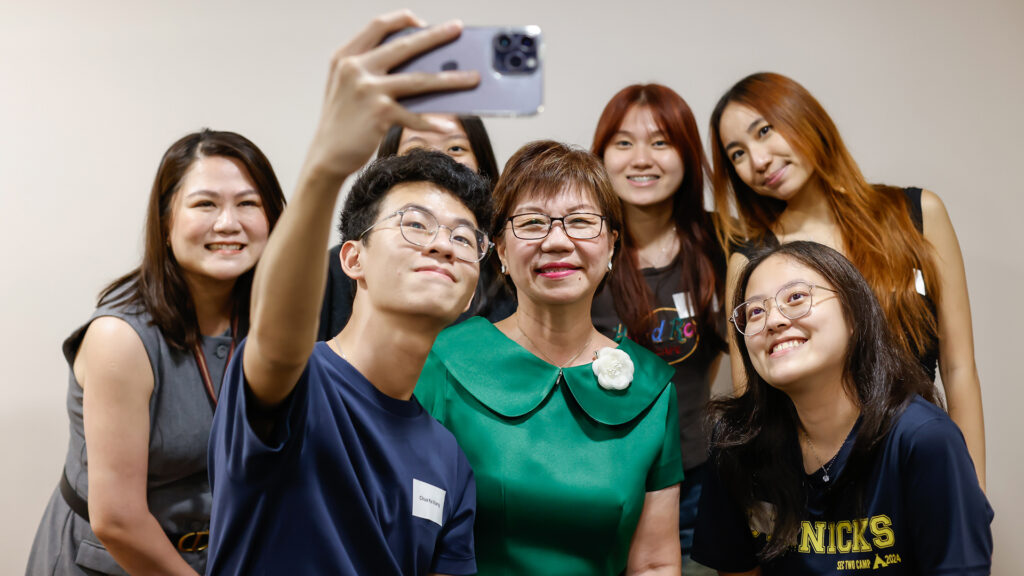Moving beyond career success to serve with purpose, integrity and compassion
October 28, 2024
IN BRIEF | 10 min read
- Titled “Lessons from a Leadership Journey into the Private, Public and People Sector”, the talk by Ms Denise Phua, Member of Parliament for Jalan Besar GRC and Mayor for Central Singapore District, at the Shaw Foundation Alumni House kicked off the new FASS Distinguished Speaker Series that was launched by the NUS Faculty of Arts and Social Sciences (FASS) in celebration of the Faculty’s 95th anniversary.
“As you step into the world, may you step out to lead with purpose, with integrity, with compassion, not just for your career but for the greater good.”
This was the clarion call sounded by Ms Denise Phua, Member of Parliament for Jalan Besar GRC and Mayor for Central Singapore District, to a 100-strong audience at a recent talk where she shared insights on career transitions and effective leadership.
Titled “Lessons from a Leadership Journey into the Private, Public and People Sector”, the session at the Shaw Foundation Alumni House kicked off the new FASS Distinguished Speaker Series that was launched by the NUS Faculty of Arts and Social Sciences (FASS) in celebration of the Faculty’s 95th anniversary. The series aims to inspire FASS students to excellence by showcasing alumni and their achievements.
The inaugural session, moderated by Professor Lionel Wee, Dean of FASS, was also attended by FASS staff and faculty.

Developing a leadership toolkit and other leadership goals
Ms Phua, who worked in the corporate, people (or social) and public sectors noted some differences in work culture and performance measurements in each of these sectors.
Performance in the private sector is typically measured in financial terms and is quantified with metrics such as market share, revenue growth, and shareholder values. The social sector values qualitative outcomes, with the focus shifting to doing good, creating societal impact, and accountability to beneficiaries, while the public sector operates within the frame of public service, governance, and accountability to the broader society.
Whichever sector one is in, it is essential to build a leadership toolkit comprising the four skills — personal mastery, interpersonal leadership, supervisory leadership and organisational leadership — in order to chart a meaningful and successful career path.
Ms Phua also emphasised the importance of having diverse experiences to remain relevant, and venturing outside one’s comfort zone in a dynamic environment to keep this toolkit updated. Citing Pope Francis, who told Singaporean youths in a recent dialogue that a young person who stays in his own comfort becomes “fat”, she urged young people to continually add skills to their toolkit and to go out there to take risks.
In her experience, having a purpose is also key as it helps to keep one’s eye on the bigger picture and the important goals to work towards. She explained, “Having a clear purpose guides our decisions and keeps us focused on what truly matters. For me personally, my faith helps to anchor me.”

Be fearless in the unknown
Another topic Ms Phua delved into was fear, something she learnt to overcome whenever she was thrust into unfamiliar situations and environments – whether it was having to work overseas with people of different backgrounds and cultures in China and the US, or having to establish new work processes or systems from scratch.
Sharing about her stint as a waitress in Palo Alto, driving alone in her twenties in the wilderness between small American towns for work, and working with people of vastly different cultures, accents and habits from her own, Ms Phua revealed that these intimidating early experiences eventually helped her overcome her fear of trying new things.
Raising a son with autism further bolstered her courage to pioneer new initiatives and projects, particularly in the area of advocacy and support for those with special needs. Stemming from a desire to create a more inclusive society where everyone can thrive, Ms Phua has made trailblazing contributions to the special needs advocacy space, which include the co-founding of Pathlight School – Singapore’s first school that offers mainstream education for autistic children, The Purple Parade – a national platform that celebrates the abilities of persons with special needs, and The Purple Symphony, Singapore’s largest inclusive orchestra set up by her and her team at the Central Singapore District Community Development Council (CDC).
She shared, “[Having the technical skills and soft skills] were really important for me in the private, people and public sector, but what was more significant was scaling the challenges I faced and overcoming the fears I had.”
As a leader, Ms Phua stressed that it is also essential to find a “tribe” and surround oneself with like-minded people who share the same values, passions or vision, and who are able to challenge one another, as the success of any project is never dependent on a single individual. This is how she managed to ideate and execute the many initiatives across the three sectors she has been involved in.

Beyond building careers to serving society
Ms Phua’s candid and personal sharing was followed by questions from students about how to choose career pathways, to make meaningful change in the community and tackle evolving social challenges in society.
Responding to a question on how she found her calling in the special needs advocacy space, Ms Phua shared that she did not identify it through any conventional career or personality quizzes. For her, she felt called to the special needs space in a rather dramatic fashion, after “God gave [her] a child who didn’t speak nor socialise at three, like other typical children.”
Referencing some of the other community initiatives and assistance schemes launched during her time as Mayor of the Central Singapore District, such as the ‘Weekly Nurture’ problem-solving and communications classes and the ‘Ready for School’ financial assistance scheme for children from low-income families, another student asked what Ms Phua considered key ingredients for success in these community projects.
Her response was simple – find the gaps, think of ways to make a difference, and then start tapping on one’s network of resources to implement solutions.
“When looking at physical wellness for seniors for example, I will ask what physical wellness means to them. Together with my team, we then brainstorm, come up with programmes, such as our CDC’s ‘Silver Homes’ and then look for resources to fund them,” she added.
When asked more broadly how Singapore can address societal issues such as an ageing population and growing income disparity, Ms Phua observed that Singapore has become more complex in many ways since 2006 when she first entered politics, making tackling such issues more challenging. However, she encouraged students to look beyond their “pet passions” and serve in areas in society that have the most need, and to stay mission-focused to continue effecting real change.
She cited the ‘power of one’. “If each of us is determined to bless other people with what we have…whether it’s our talent, our gift, our networks, then organisations, nations and societies will all be for the better,” said Ms Phua.
This story first appeared on NUSnews on 28 October 2024.

